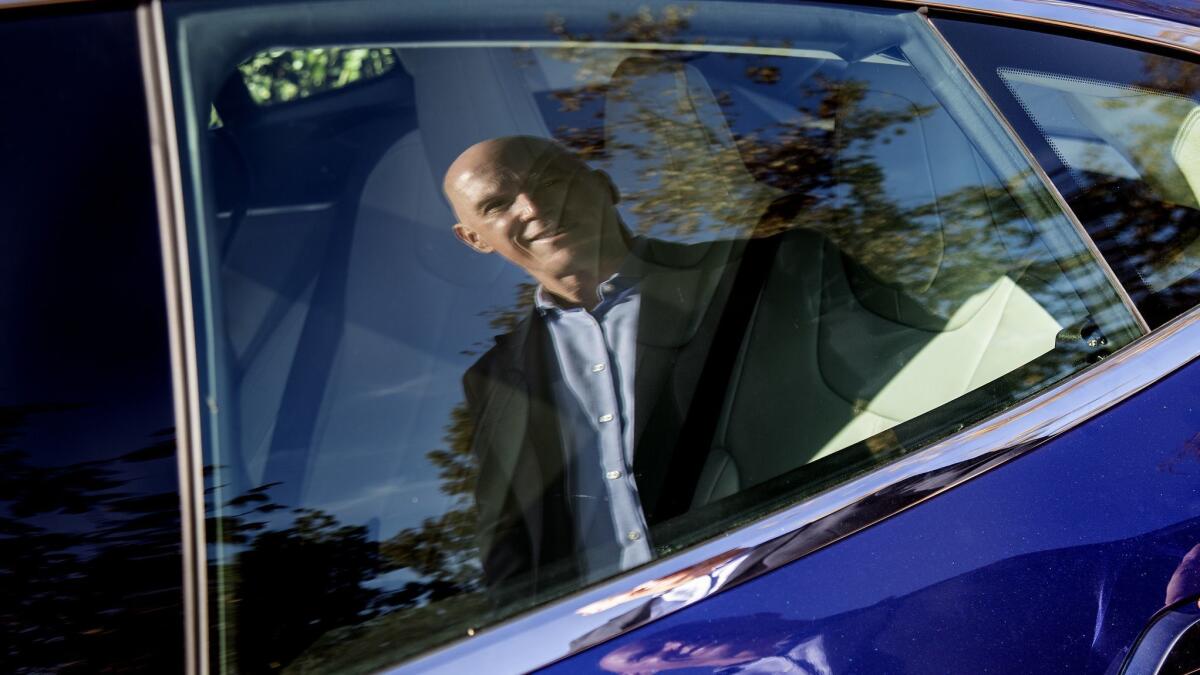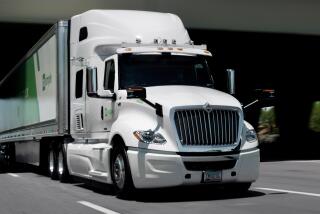How I Made It: He links China and U.S. on robot cars and electric vehicles

After a 25-year career in Asia, Michael Dunne returned to the U.S. and founded ZoZo Go, a consulting company focused on electric and autonomous vehicles that advises American companies entering the China market and Chinese companies entering the U.S. The company maintains operations in San Diego, Hong Kong and Shanghai.
Spying with dad
Growing up in Detroit, where his father was an editor specializing in automobiles at Popular Science and Popular Mechanics, Dunne watched a new car appear in the driveway each week. “Beautiful cars from all over the world — BMWs, Jaguars, Porsches. That made a big impression.”
When Dunne got his license, he would drive his father on reconnaissance missions. “My dad had a reputation as a car spy. He was notorious for getting photographs of future cars before anyone else,” he said. “We’d go out on a two-lane country road outside the General Motors proving grounds in Milford [Mich.]. We’d reach the peak of a hill where you could see over the fence. He’d stick his lens out the passenger window. There was a several-hundred-feet window where we could see the cars. He’d kill for a shot of a new Corvette.”
Learning Frost
“I was the fourth of seven kids. My dad made us an offer: He’d give $25 to anyone who could recite ‘The Road Not Taken,’ by Robert Frost. I’ve carried the last stanza with me for years.”
I shall be telling this with a sigh
Somewhere ages and ages hence:
Two roads diverged in a wood, and I —
I took the one less traveled by,
And that has made all the difference.
‘Go to China’
A French major at the University of Michigan, Dunne spent his junior year studying in Aix-en-Provence in the south of France. “A professor I respected told me, ‘If you’re interested in the future there’s only one thing to do. Go to China. Find out what it’s all about.’”
Dunne went on to get a joint master’s degree in Chinese and business marketing. “I studied Chinese language, history, politics. If there was a course on China, I signed up.”
Wild frontier
“In 1990 in Michigan, I had two choices. I could join one of the Big Three automakers on an executive track position out of the University of Michigan, the usual course. Or I could get on a plane and try to build a business on my own. I got on a plane.
“There was a magnet pulling me to Asia,” Dunne said. “I think it comes from spying on cars. Go where the action is and find out.”
Talking the talk
With $3,000 and his Apple computer, Dunne started his first company, Automotive Resources Asia Ltd., working with automakers and global parts suppliers looking to enter Thailand, Vietnam, China and Indonesia.
“Asia is all walls and locked barriers, especially in business. Speaking the local language gave me keys to the kingdom,” he said. “Right away, I could see their shoulders relax. Understanding Chinese — while not letting on — was also a powerful tool in the negotiating room.”
A slow start
“I had a gut feeling that China would emerge as a powerful economy in the future, that people would want to buy cars, that American companies would want in, and they’d need a guy there on the ground who knows the language, knows the way the Chinese think.”
But establishing himself as the guy on the ground took time. “Starting my first business in Asia really tested my courage, my resolve. I remember the student loan coupon books stacked up high on my desk. I had few business leads, surviving on just scraps of revenues from small assignments here and there,” Dunne said.
“I called home at Christmas and told my dad things were not going well. ‘I know you’ll work it out,’ he said. A few weeks later, I got a call from Kerry Ivan, the top Chrysler guy in Southeast Asia. ‘We need some help with Jeeps tied up at the port,’ he said. That was an opening I needed.”
Business, baseball, bride
“Meantime, I was traveling around Southeast Asia on a softball team, combining baseball and business. I’d play ball on the weekends, and on Monday and Tuesday I’d meet with auto executives.
“And that’s how I met my wife, Merlien, in Indonesia, at the Senayan baseball fields [in] downtown Jakarta.”
Better make plans
The next 25 years involved different facets of the car business. “We began to shift our services to customer perceptions about quality and value, and began working closely with JD Power. In 2006, JD Power acquired us, and I led the China operation,” Dunne said.
“After a great run there — we more than tripled sales — I moved with my family to Indonesia and founded an internet sales portal, Car Keys Asia. It was based on the Cars.com model, and [I] sold it at a good profit to local investors.
“I wrote a book about China’s car market — ‘American Wheels, Chinese Roads’ — and I ran GM’s Indonesia operations. But in 2014 GM said, ‘We’re going to wind Indonesia down. Better make plans.’”
ZoZo Go
“Something on the horizon was catching my eye — this electric vehicle revolution in California. And China had the same ambition. I had the same feeling I had about China 25 years earlier. Electric and autonomous vehicles are on the way. Let’s get on the wave.”
Dunne, now 55, moved with his wife and three children to San Diego “for the sunshine and the waves and to be close to the automotive tech action in Silicon Valley.” He founded ZoZo Go. “In Chinese, ZoZo means ‘to be on the move, get from here to there,’” he said.
“We’re connecting American companies that want to work with the Chinese — dealers, dealer network planners, American technology companies who want to go to China. And it’s two-way traffic. Chinese companies want to go global as their home market is reaching saturation. They’ll inevitably want to come to the United States.”
Roll with it
“In Asia, I was influenced by and learned to respect Buddhism, particularly the aspect that says nothing is permanent, there are no fixtures in life, things are evolving. Look at what is changing, who is changing, how they are changing. Roll with it. Go with it.”
More to Read
Inside the business of entertainment
The Wide Shot brings you news, analysis and insights on everything from streaming wars to production — and what it all means for the future.
You may occasionally receive promotional content from the Los Angeles Times.











